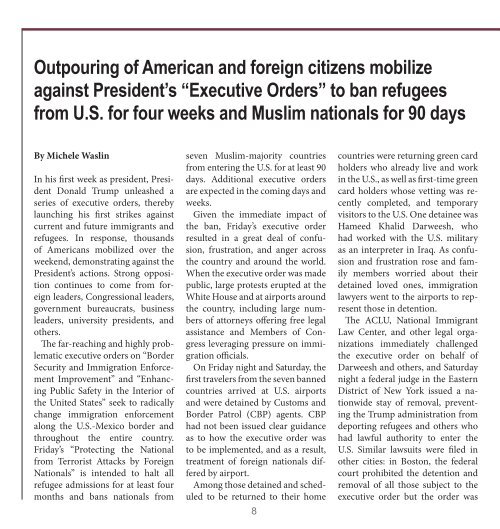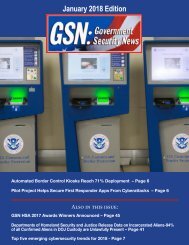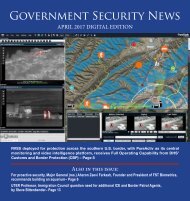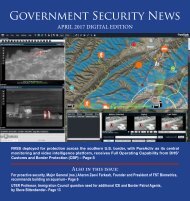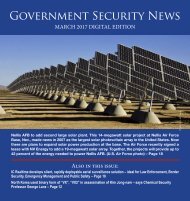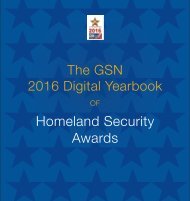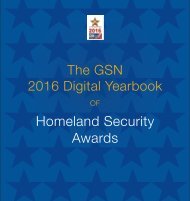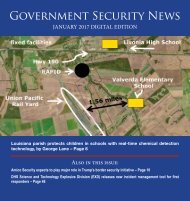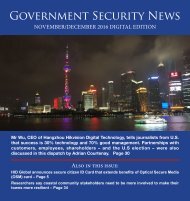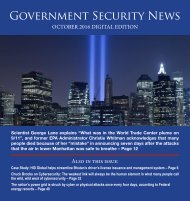Government Security News February 2017 Digital Edition
You also want an ePaper? Increase the reach of your titles
YUMPU automatically turns print PDFs into web optimized ePapers that Google loves.
Outpouring of American and foreign citizens mobilize<br />
against President’s “Executive Orders” to ban refugees<br />
from U.S. for four weeks and Muslim nationals for 90 days<br />
By Michele Waslin<br />
In his first week as president, President<br />
Donald Trump unleashed a<br />
series of executive orders, thereby<br />
launching his first strikes against<br />
current and future immigrants and<br />
refugees. In response, thousands<br />
of Americans mobilized over the<br />
weekend, demonstrating against the<br />
President’s actions. Strong opposition<br />
continues to come from foreign<br />
leaders, Congressional leaders,<br />
government bureaucrats, business<br />
leaders, university presidents, and<br />
others.<br />
The far-reaching and highly problematic<br />
executive orders on “Border<br />
<strong>Security</strong> and Immigration Enforcement<br />
Improvement” and “Enhancing<br />
Public Safety in the Interior of<br />
the United States” seek to radically<br />
change immigration enforcement<br />
along the U.S.-Mexico border and<br />
throughout the entire country.<br />
Friday’s “Protecting the National<br />
from Terrorist Attacks by Foreign<br />
Nationals” is intended to halt all<br />
refugee admissions for at least four<br />
months and bans nationals from<br />
seven Muslim-majority countries<br />
from entering the U.S. for at least 90<br />
days. Additional executive orders<br />
are expected in the coming days and<br />
weeks.<br />
Given the immediate impact of<br />
the ban, Friday’s executive order<br />
resulted in a great deal of confusion,<br />
frustration, and anger across<br />
the country and around the world.<br />
When the executive order was made<br />
public, large protests erupted at the<br />
White House and at airports around<br />
the country, including large numbers<br />
of attorneys offering free legal<br />
assistance and Members of Congress<br />
leveraging pressure on immigration<br />
officials.<br />
On Friday night and Saturday, the<br />
first travelers from the seven banned<br />
countries arrived at U.S. airports<br />
and were detained by Customs and<br />
Border Patrol (CBP) agents. CBP<br />
had not been issued clear guidance<br />
as to how the executive order was<br />
to be implemented, and as a result,<br />
treatment of foreign nationals differed<br />
by airport.<br />
Among those detained and scheduled<br />
to be returned to their home<br />
8<br />
countries were returning green card<br />
holders who already live and work<br />
in the U.S., as well as first-time green<br />
card holders whose vetting was recently<br />
completed, and temporary<br />
visitors to the U.S. One detainee was<br />
Hameed Khalid Darweesh, who<br />
had worked with the U.S. military<br />
as an interpreter in Iraq. As confusion<br />
and frustration rose and family<br />
members worried about their<br />
detained loved ones, immigration<br />
lawyers went to the airports to represent<br />
those in detention.<br />
The ACLU, National Immigrant<br />
Law Center, and other legal organizations<br />
immediately challenged<br />
the executive order on behalf of<br />
Darweesh and others, and Saturday<br />
night a federal judge in the Eastern<br />
District of New York issued a nationwide<br />
stay of removal, preventing<br />
the Trump administration from<br />
deporting refugees and others who<br />
had lawful authority to enter the<br />
U.S. Similar lawsuits were filed in<br />
other cities: in Boston, the federal<br />
court prohibited the detention and<br />
removal of all those subject to the<br />
executive order but the order was


